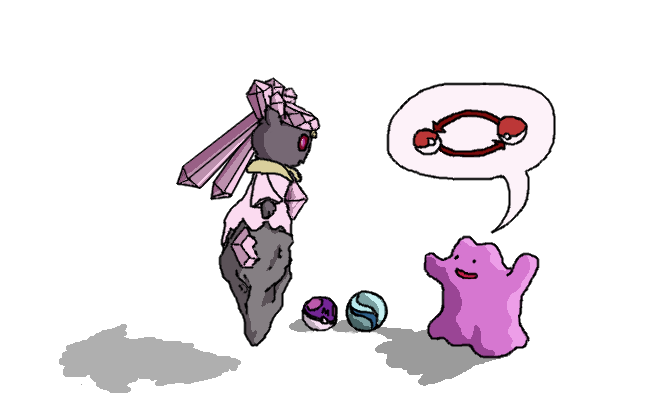The Wi-Fi Economy
| « Previous Article | Home | Next Article » |

Pokémon Showdown's Wi-Fi room has taken on a life of its own. No, it has not become sentient, nor is it trying to destroy the human race. The Wi-Fi room has developed an entire "economy", simply through sheer happenstance, and quite frankly, it's amazing. Over the past year, I've had the pleasure to observe, as well as help curate, this economy. I got to watch it grow, trim its edges, help send it on the right track when it veered off course, and of course, protect it from black market goods. Say what you will, what has been created in the Wi-Fi room is about as close to a real-world economy as it gets.
Let's say that you walk into a flea market. You see a watch that you really like. However, there are loads of other people who also like that watch. Obviously, that watch is instantly more valuable, and you'll have to pay a higher price for the watch. Same goes for, say, furniture. Handmade, ornate, one of a kind pieces are obviously going to sell for more that churned-out common Ikea garbage. See, all this is because of supply and demand, and it translates perfectly to the Pokéconomy (excuse my abysmal world-coining skills) of the Wi-Fi room.
At its basic terms, an economy can be described as "the wealth and resources of a country or region, especially in terms of the production and consumption of goods and services." While Wi-Fi is no country, there are definitely goods and services being traded. Let me put this in a pseudo-story form in order to explain all of the moving parts of this complex economy:
Little Johnny, fresh off of beating the Elite Four, decides he wants to get into Pokémon trading! So of course, he comes to Pokémon Showdown! and joins the Wi-Fi room. However, he only has one shiny Quagsire that he caught on his journey, and the economy does not find that "trophy" shiny valuable. Ergo, he must find a way to pass the "barrier of entry" and get his first tradable shiny. So, he decides to become a registered EV trainer, and eventually, someone hires him to train his or her Pokémon, with the payment being a shiny Greninja. Huzzah! However, due to the room being saturated with shiny Greninjas (read: inflation), he finds it very hard to get a trade. Luckily, he knows he can get it cloned, if there's a cloner who is willing to help. And Johnny knows that this cloner is not going to rip him off and commit fraud, because the room's scammers list and approved cloners list act as a guarantee (just like government protections). Yet, that cloner is also "taxed" in a way. In order for the cloner to stay registered with the room, they must do a monthly giveaway. These giveaways serve to help people like Johnny enter higher tiers of trading. See, the economy works as so:
- At the top are Shiny 5-6 IV nicknameable Kalos-born Pokémon in special Balls (Apricorn or Dream)
- Below that are Shiny 5-6 IV nicknameable Kalos-born Pokémon
- Lower are Shiny 5-6 IV Kalos-born Pokémon in special Balls
- Following that are Shiny 5-6 IV Pokémon not born in Kalos (this includes legendaries)
- Below that are Trophy Shinys, regular 5-6IV Pokémon, regular Pokémon, etc.
So, Johnny wins a few giveaways, helps people complete their dex and gets a few rewards from them while doing so, opens up his own "shop" like many users have, gets a 6IV Ditto, starts breeding, and becomes a valued member of the economy.
Pokémon lends itself to the creation of mini-economies centered around each individual person's resources. However, in Wi-Fi, we've given everyone a chance to grow, and lowered the entry barrier through giveaways, specialized lists like breeders and trainers, as well as the "cloners' tax." The real beauty of the system, though, is that we managed to lower the bar of entry without devaluing rare commodities and the hard work of active traders and breeders.
At this point, I would be remiss if I didn't mention the impact that hacking has on this economy. Hacking creates a black market for these goods, and hacked trades are something that we as the Wi-Fi room cannot extend our anti-scamming protections towards. Because hacking devalues the hard work that makes the economy unique, it de-incentivizes trading to a point where it inflates the population of every "commodity" Pokémon, and those who have access to cheating devices centralize the wealth around themselves, and, as it has been shown in the past, are very resistant to trading, to the point of greediness. The question becomes "what's the point of trading if I can have it all on my own?" This is something that kills the economy. However, we've got many ways to combat this, such as a "hacked Pokémon" list, and auth who are very committed to keeping the economy squeaky clean.
Anyway, I'd rather not leave things on a dark note, so I won't! What's been created in Wi-Fi, and what we as the Wi-Fi room staff are continuously manicuring, tweaking, and helping grow, is honestly as close to a full fledged economy as it gets, without actually introducing the concept of money into the equation. And quite frankly, that is amazing. It says a lot about the human mind, as well as our tendencies to organize. But, at the end of the day, it's still all about swapping your 'mons for the other guy's 'mons, filling out the dex, and catching 'em all!
| « Previous Article | Home | Next Article » |